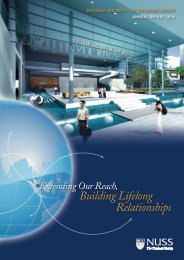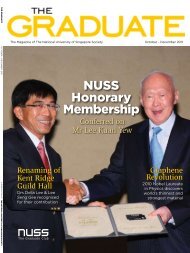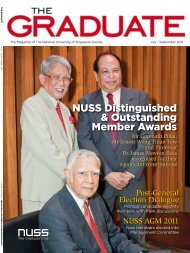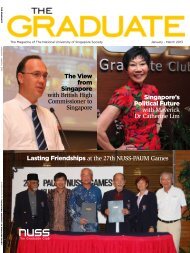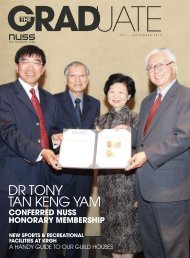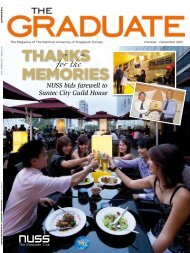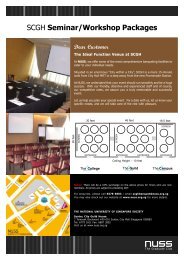Ben Cao GanG Mu - NUSS
Ben Cao GanG Mu - NUSS
Ben Cao GanG Mu - NUSS
You also want an ePaper? Increase the reach of your titles
YUMPU automatically turns print PDFs into web optimized ePapers that Google loves.
Indeed, where herbal medication is concerned, there<br />
are numerous factors which affects the effectiveness<br />
of the medicine. For one, the authenticity of the herb’s<br />
signature impacts the effectiveness of the treatment. Other<br />
environmental factors that the herbs are subjected to during<br />
its growth might also potentially have negative or reinforcing<br />
impact on its overall effectiveness. Despite the criticism,<br />
research in the area is not advancing sufficiently to ward<br />
off detractors because of the high costs and specialised<br />
expertise required.<br />
Of course, herbal medicine is not totally without its<br />
contribution to the medical industry. For instance, the<br />
Chinese Wormwood is now used globally to treat malaria<br />
and Chinese Ephedra has been attributed to the discovery of<br />
treatments for asthma and Hay Fever.<br />
Contrary to herbal medicines, acupuncture drew much<br />
research interest. One area where acupuncture is deemed<br />
to be convincingly effective is in the treatment of nausea<br />
and seasickness. Increasingly, there are seasick armbands<br />
available in the market that works by essentially pressing<br />
on an acupuncture point on the wrist. Scientific and<br />
anecdotal evidence have shown that this is effective in<br />
preventing nausea.<br />
A 2008 study also suggested that combining<br />
acupuncture with conventional infertility treatments<br />
such as IVF greatly improves the success rates of<br />
such medical interventions. In a recent report, The<br />
World Health Organisation has also issued favourable<br />
observations on acupuncture in the areas of “adult<br />
postoperative and chemotherapy nausea and vomiting<br />
and in postoperative dental pain”.<br />
Beyond these, however, the rest of the research results<br />
are more often than not controversial. In Edzard Ernst’s<br />
words, Professor of Complementary Medicine in the<br />
United Kingdom, “research in the area is growing<br />
but emerging clinical evidence seems to imply that<br />
acupuncture is effective for some but not all conditions.”<br />
Most chronic ailments, for example, such as back-pain,<br />
neck-pain and headache, have conflicting anecdotal<br />
evidence with acupuncture.<br />
Given the ongoing debate surrounding TCM and its<br />
continued rise in popularity, medical practitioners are<br />
cautious in using TCM as the sole treatment method.<br />
Rather, TCM is often recommended as a means to<br />
strengthen health and as a complementary form of<br />
medicine to conventional treatment.<br />
TCM – Is it Safe?<br />
Even then, patients who are contemplating to seek TCM<br />
as a treatment to should be wary of some of the potential<br />
safety issues.<br />
inside<br />
sTory<br />
0



